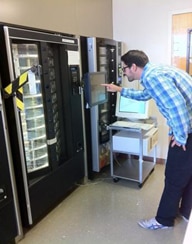Research Updates

Brain stimulation limits calories consumed in adults with obesity: An NIDDK study found that non-invasive brain stimulation decreased calorie consumption and increased weight loss in adults who are obese. The findings suggest a possible intervention for obesity, when combined with healthy eating and exercise. The study’s computerized vending machine contained a variety of foods and drinks for the participants to choose at will. Results were published in Obesity concurrent with a presentation at the 2015 Obesity Society meeting.
Early, intensive treatment may be needed for some youth with type 2 diabetes: Youth with type 2 diabetes who do not get their blood glucose levels into a nondiabetic range using metformin alone tend to quickly advance to higher blood glucose levels, according to the latest findings of the Treatment Options for Type 2 Diabetes in Youth study (TODAY). Results of the study, funded largely by the NIDDK, were published in Diabetes Care.
Long-term health of kidney donors assessed: Few studies have assessed the health of living kidney donors after donation. Now an NIDDK-funded study has found that kidney function in donors did not deteriorate three years after donation, while healthy volunteers in a control group experienced expected age-related declines in kidney function. Results were published in the American Journal of Kidney Diseases.
Low red blood cell vitamin C concentrations induce red blood cell fragility: Because red blood cells are less deformable in diabetes, researchers explored an original concept linking decreased red blood cell deformability to red blood cell vitamin C and hyperglycemia. They characterized vitamin C concentrations from human and mouse red blood cells and plasma, and showed an inverse relationship between red blood cell vitamin C concentrations and deformability, measured by osmotic fragility. The findings were published in EBioMedicine.
More than half of Asian Americans with diabetes are undiagnosed: More than half of Asian Americans and nearly half of Hispanic Americans with diabetes are undiagnosed, according to researchers from the NIDDK and the Centers for Disease Control and Prevention. Their results were published in JAMA, the Journal of the American Medical Association.
Natural compound prevents obesity in mice: An NIDDK-led team has found that treatment with celastrol enabled normal-weight male mice to avoid obesity and metabolic dysfunction despite being fed a high-fat diet. Celastrol is a natural compound extracted from the root of the thunder god vine. The findings suggest that celastrol kept the mice lean by transforming their white fat, which stores energy, into brown-like fat, which burns calories, and increasing mitochondrial capacity and muscle endurance. Results were published in Cell Metabolism.
Teens achieve weight loss, health benefits with bariatric surgery: Bariatric surgery resulted in major weight loss and improvements in overall health and quality of life three years after the surgeries were performed in a group of teens with severe obesity, according to the latest findings of the Teen Longitudinal Assessment of Bariatric Surgery, or Teen-LABS. Results of the study, largely funded by the NIDDK, were published in The New England Journal of Medicine.
